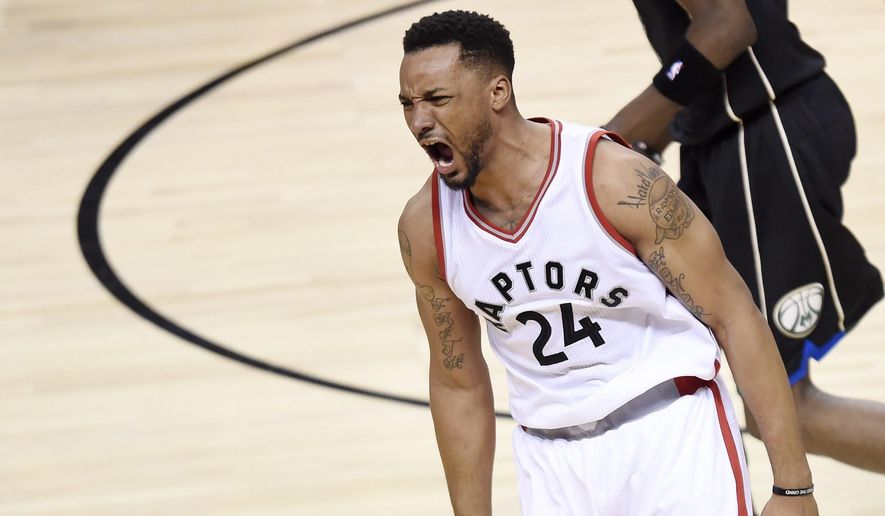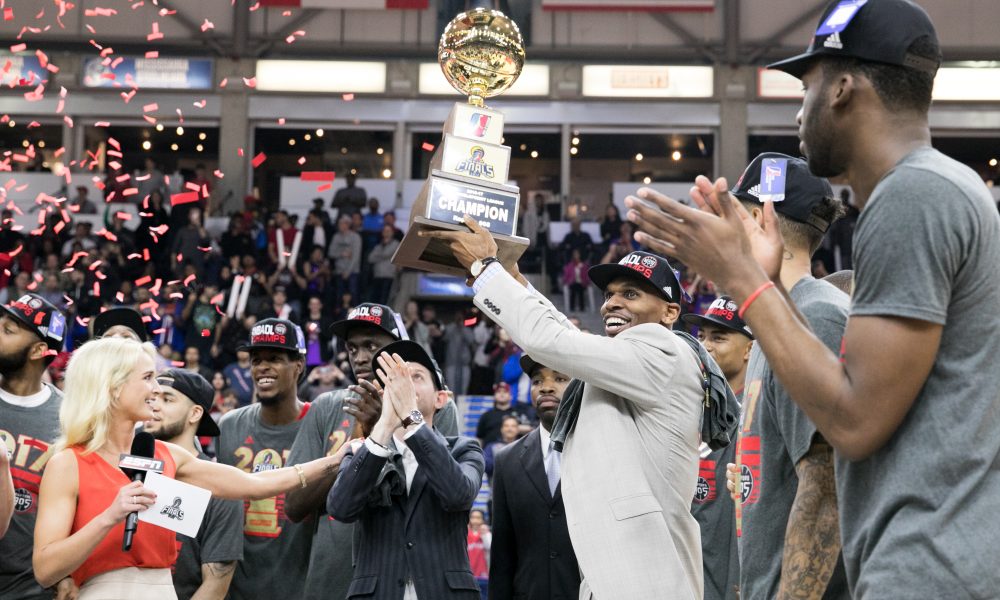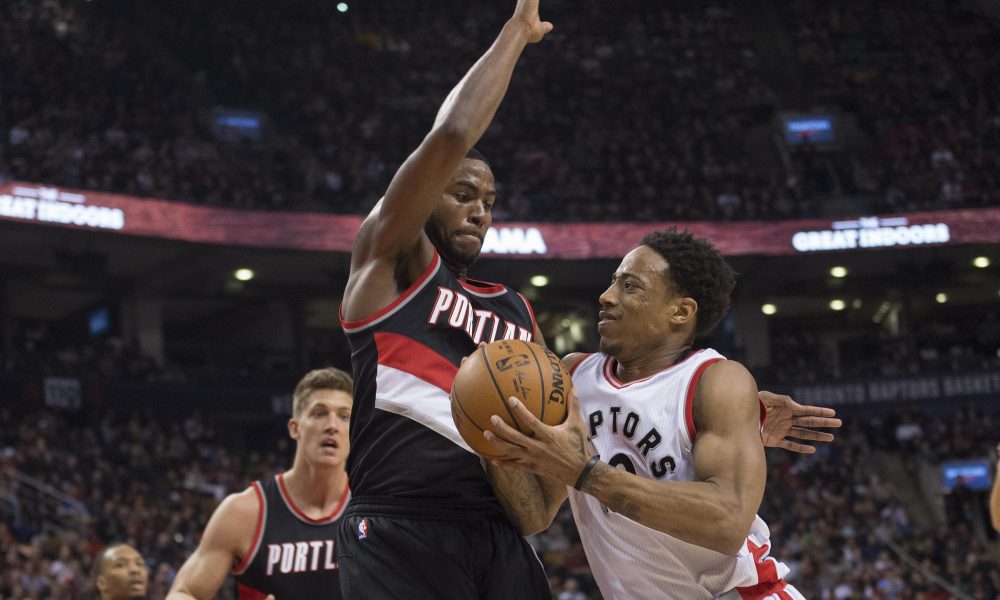The Toronto Raptors have agreed to a four-year, $42-million extension with Norman Powell, according to a report from Adrian Wojnarowski of ESPN.
The figure Wojnarowski is reporting is Powell’s maximum allowable extension under the current collective bargaining agreement. Powell’s considered in the “veteran extension” class because he signed a three-year deal as a second-round pick, whereas first-round picks sign to the rookie scale and qualify for a different set of extension options. Powell could only earn up to 120 percent of the estimated average salary in Year One of the contract, with an annual raise of eight percent of that first-year number, non-compounding.
The extension will see Powell earn roughly $9.4 million for the 2018-19 season, $10.1 million the year after, $10.9 million the year after that, and $11.6 million in 2021-22 for a total of approximately $41.9 million, based on current estimates. The final year of the deal is a player option (which was probably the concession the Raptors had to make to get the deal done, allowing Powell to potentially re-enter free agency at 28.)
Getting Powell to sign the extension would have taken some careful conversations, with market signals pulling Powell’s camp in multiple directions. When Josh Richardson of the Miami Heat signed the same deal a few weeks back, that seemed to suggest a Powell extension was at least feasible, based on comparable players. Powell is a better prospect than Richardson, but their path to this point and their production have been quite similar. The cold restricted free agent market and the coming league-wide financial crunch in the summer of 2018 are also factors, though Powell could have looked at the small handful of larger deals that were handed out to restricted free agents the past few summers and thought he could do better than $10.5 million per-year.
I wrote a lot more about this two weeks back for The Athletic. Basically, it’s the usual trade-off between long-term security and betting on yourself for the chance at a bit more. Powell seems the bet-on-himself type, but he’s also only made about $3 million over his first three years in the league
By signing, Powell not only locks in a great deal of money over the next four years but cements himself as a major part of the Raptors present and future. The Raptors are making a clear statement that Powell is to be considered a part of the core with Kyle Lowry, DeMar DeRozan, and Serge Ibaka. This isn’t the first signal, either – Powell joined DeRozan and head coach Dwane Casey in visiting Lowry this offseason, too, and he’s long been trusted as a leader of the team’s younger core, a lead-by-example type who has to be begged to leave the gym. There was some concern that the Raptors may not be able to retain Powell long-term, and options for that scenario were explored, and the team’s surely thrilled to have pen to paper at this amount, without risk of a heftier offer sheet seeing him flee for nothing this summer.
In terms of price, it’s hard to argue. It’s about what the market dictates, and depending on your comparison point, it looks like either a modest discount or the right price. There will always be Tim Hardaway Jr. and Allen Crabbe contracts, but with money tight this coming year, those may not have been there. The Raptors could have tried to play it tighter, too, but they’re paying a shade over what the mid-level exception will be for a player they really like, a two-way piece with some remaining upside to tap into. It takes a great deal of uncertainty off the table as it pertains to next offseason, and the entire three-year window for this current core. (That Powell’s deal extends two years beyond that window also suggests the team believes he can be a big piece in the event they pivot to a different timeline, and his deal should be fairly movable whatever happens.)
There are complications that loom, of course. It’s little secret that the Raptors are light on financial flexibility during this competitive window, and locking Powell in to an eight-figure salary figures to push the team deep into the luxury tax next summer. Including options for the players on rookie deals but not including new deals for Bruno Caboclo, Lucas Nogueira, or Fred VanVleet, the Raptors have about $125 million committed to 10 players (not including unlikely bonuses that could count toward the tax calculation), about $2 million over the projected luxury tax line for 2018-19. Add in deals for the other restricted free agents or roster-filler pieces, and there isn’t a great deal of room to fortify, even if the team’s willing to pay fairly deep into the tax.
That will undoubtedly put eyes on the rumor mill as it pertains to Jonas Valanciunas again this summer, through no fault of his own. He’ll be their best means of ducking back beneath the tax or, if they can add elsewhere, lessening the bill, especially if he winds up having as strong a season as the first two preseason games suggest he may be in for. The Raptors can cross that bridge when they come to it in July, knowing they’ll have plenty of time to get under the tax line before the end of 2018-19, even if they lose some leverage or flexibility in the process.
The No. 46 overall pick in the 2015 draft, Powell became an instant fan favorite in Toronto after being acquired along with a first-round pick for Greivis Vasquez on draft night. Powell turned in an All-Tournament performance at his first Las Vegas Summer League to help convince the team to sign him (they did so to a three-year deal rather than four because otherwise he’d be headed for unrestricted free agency in 2019), then dominated D-League competition before stepping into an important and unexpected role during the stretch run. In the first round of the playoffs, he helped swing the team’s series against the Indiana Pacers, and his open-court dunk in a remarkable Game 5 comeback has quickly risen toward the top of any all-time Raptor highlight lists.
https://www.youtube.com/watch?v=Q6umz8HY-HI
Powell’s sophomore season didn’t go quite as well, given higher expectations and a larger, if still inconsistent role. He took continued strides as a scorer and as a playmaker, but his 3-point shooting regressed in the regular seasons and he had stretches where he didn’t look like quite the same defender he was as a rookie. His advanced metrics showed a slightly negative impact on defense, though there’s a ton of noise based on his changing responsibilities and generally guarding the best opposing wing when on the floor. His scoring numbers jumped, at the very least, from 5.6 points to 8.4 and from 54.1-percent true-shooting to 55.2. The playoffs saw Powell round back into form and help swing another playoff series, and his ascension as an impact two-way piece allowed the Raptors to proceed about their offseason knowing he’d be in a significant role.
It’s unclear if Powell will join the starters this season or come off the bench as a potential high-scoring Sixth Man candidate. If he starts, his defense will be valuable, and he’ll get to attack scattered defenses as a tertiary scoring option alongside Lowry, DeRozan, Ibaka, and Valanciunas. It’s a natural fit for him and would allow C.J. Miles to provide shooting off the bench. He may be best off as a reserve, though, where he and Delon Wright have developed a quick chemistry, and where he’d see a far greater share of the touches playing with only one of Lowry and DeRozan for the bulk of his minutes. Powell can lead a second-unit offense as a mean pick-and-roll ball-handler and help forge an identity for a fast, unrelenting, and youthful bench mob, should the Raptors choose to go that route.
In any case, he figures to jump from 18 minutes a game to somewhere close to 30 and should be a part of closing lineups more often than not, whether they’re downsized or not. This is one of the more difficult jumps to make, role player to core piece, and it’s not a certainty Powell can deliver on this deal. Market changes or young players stalling out can make good deals look bad down the line. On balance, this one seems mostly safe, and Powell’s long appeared ready for this next step. This year should be telling, and the Raptors’ optimism is entirely warranted. Risk-taking is a part of getting players locked up, and any risk here seems reasonable.
Should he continue to improve as a playmaker and find the consistency on the defensive end that sometimes takes a while for young players to establish, this contract could very well look like a steal in short order. That goes doubly if his 3-point shot, which has jumped all over but looks about average in the large sample, winds up being a plus-tool. Even if Powell’s development were to stall from here – unlikely given he’s 24 and has an already legendary work ethic – it’s a pretty safe bet from the team side. It’s a bet on a player they loved from pre-draft workouts onward and have helped to develop over the last two-plus years, too, which almost always sends a positive message.
This is a great day for Powell, the next step in a career that’s had him play his way from bit-player at UCLA to college star, and then from second-round afterthought to NBA rotation piece. Given his ascension at each stage, the Raptors likely feel comfortable betting on his continued progress into one of the core members of their franchise.



